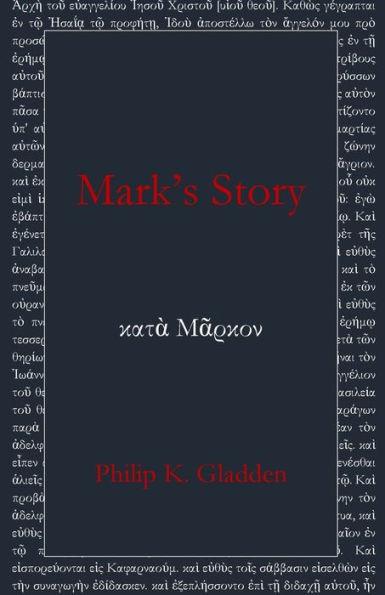Mark's Story

Mark's Story
kai; ejxelqou: sai e[fugon apo; tou: mnhmeivou, ei\\cen ga;r aujta;V trovmo V kai; e[kstasiV kai; oujdeni; oujde;n ei\\pan, ejfobou: nto gavr. (Mark 16:8) And when they went out, they fled from the tomb, for trembling and amazement had them; and they said nothing to no one, for they were afraid. Yes, Bibles include verses 9 - 20 at the end of Mark, but I am convinced that Mark ended his gospel with verse 8. What a strange ending - "They said nothing to no one, for they were afraid" - to a story whose purpose is to tell "the good news of Jesus Christ Son of God." (Mark 1:1)
This mysterious and abrupt ending of Mark's gospel and the immediacy of his story are the two main characteristics of this narrative account that captured my attention a few years ago. When I was in seminary at Union Theological Seminary in Virginia (now Union Presbyterian Seminary) from 1979-1983, and again when I was working on my Ph.D. in New Testament Biblical Studies (also at Union) from 1986-1991, I was immersed in the historical-critical method of biblical exegesis. The discipline of "narrative criticism" of the Bible was just being developed. If this new discipline of interpretation was mentioned at all, it was in passing and somewhat disparagingly.
But Mark tells a story - "the greatest story ever told!" - and his story deserves to be read, heard, and interpreted as such. The third characteristic of the gospel that fascinates me is that Mark was the first gospel written, around 65 C.E. Although not all scholars agree with this claim of Marcan priority, a convincing case can be made. Because Mark's gospel is first, the questi
PRP: 186.03 Lei
Acesta este Pretul Recomandat de Producator. Pretul de vanzare al produsului este afisat mai jos.
167.43Lei
167.43Lei
186.03 LeiIndisponibil
Descrierea produsului
kai; ejxelqou: sai e[fugon apo; tou: mnhmeivou, ei\\cen ga;r aujta;V trovmo V kai; e[kstasiV kai; oujdeni; oujde;n ei\\pan, ejfobou: nto gavr. (Mark 16:8) And when they went out, they fled from the tomb, for trembling and amazement had them; and they said nothing to no one, for they were afraid. Yes, Bibles include verses 9 - 20 at the end of Mark, but I am convinced that Mark ended his gospel with verse 8. What a strange ending - "They said nothing to no one, for they were afraid" - to a story whose purpose is to tell "the good news of Jesus Christ Son of God." (Mark 1:1)
This mysterious and abrupt ending of Mark's gospel and the immediacy of his story are the two main characteristics of this narrative account that captured my attention a few years ago. When I was in seminary at Union Theological Seminary in Virginia (now Union Presbyterian Seminary) from 1979-1983, and again when I was working on my Ph.D. in New Testament Biblical Studies (also at Union) from 1986-1991, I was immersed in the historical-critical method of biblical exegesis. The discipline of "narrative criticism" of the Bible was just being developed. If this new discipline of interpretation was mentioned at all, it was in passing and somewhat disparagingly.
But Mark tells a story - "the greatest story ever told!" - and his story deserves to be read, heard, and interpreted as such. The third characteristic of the gospel that fascinates me is that Mark was the first gospel written, around 65 C.E. Although not all scholars agree with this claim of Marcan priority, a convincing case can be made. Because Mark's gospel is first, the questi
Detaliile produsului








